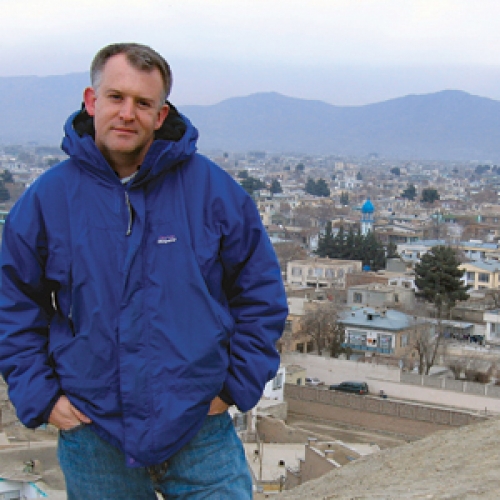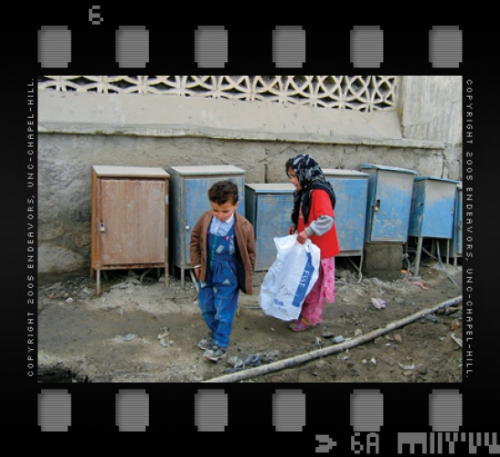We know about the casualties of war. Soldiers and civilians, communities and economies. But a casualty of war we don’t often talk about, at least not in the way we talk of the wounded and the dead, is the collapse of the state itself. In Afghanistan, Iraq, and dozens of other countries, the state has fallen on the battlefield, in need of urgent care.
Andrew Reynolds, associate professor of political science at Carolina, argues that practicing political scientists have done a poor job diagnosing the problems in failed states and have consequently advised, or even pushed, countries to adopt inappropriate systems. “We’re learning lessons through mistakes, in Iraq for example, but those mistakes cost hundreds and thousands of lives,” he says.
So Reynolds has crafted a new framework for thinking about emerging democracies. It’s based on data, experience, and theory, and expressed through an analogy: that a failed state’s journey to complete recovery will move through the stages of triage and emergency medicine, convalescence, and long-term health management. In the book he’s writing, Reynolds prescribes an approach he hopes will change the way political scientists, State Department specialists, United Nations officials, and politicians think about the structures of democracy and how to devise appropriate courses of treatment in failed states.
Approaching every state as a unique case “is one of the things that the framers of the American constitution and the framers of postmedieval European constitutions realized,” Reynolds says. “It was not just about holding an election, it was really crafting forms of government that were sensitive to the local needs.” Reynolds, a native of London, learned these principles while working with governments and oppositions in countries such as South Africa, Guyana, Sierra Leone, Indonesia, Zimbabwe, Burma, Kenya, and others. Currently, he’s applying what he’s learned as he advises leaders in Afghanistan, Iraq, and the Sudan.
Like a doctor, a constitutional advisor should take the vital signs and ask the patient questions, Reynolds says. How highly or poorly institutionalized are party and electoral politics in the country? Has the state collapsed, or does it continue to function even under crisis conditions? How many distinct ethnic or other communal groups are there? Could the core of the trouble lie in disputes over resources, in addition to (or even more than) ethnic, cultural, and religious differences?
In countries that have never had a tradition of representative government, would-be democrats emerging from civil war or the rule of dictators often have little practical knowledge of democracy. That’s when leaders turn for help from people such as Reynolds. He’s become part of what he calls the “growth industry” of constitutional and electoral design, a field that has blossomed in the past fifteen years, following the collapse of the Soviet Union and the redemocratization of parts of Africa.
Since then, governments, alliances, and nongovernmental organizations have had to relearn the art of writing democracy, with mixed results. In Angola, international mediators brokered a peace settlement in 1991 and helped craft an electoral plan that virtually assured the opposition a “winner-takes-all” victory over Jonas Savimbi’s Unita guerrilla movement. It could have been predicted, Reynolds says, that when Savimbi lost handily in the 1992 election, leaving his faction nearly powerless in the legislature, Unita would take up arms and hundreds of thousands more Angolans would die. Now that such early failures have become evident, Reynolds believes it’s time to shake up the field of constitutional design.
By taking a more deliberate, diagnostic approach to democratization in a particular country, constitutional framers avoid the perils of relying too heavily on their own experiences of democracy. They become more open to suggesting alternate forms of electoral democracy, and they are more able to see through the selfish interests of negotiating parties who, as Reynolds puts it, “are often real bad guys.”
“I have to say, most of the processes I’ve been involved with have been haphazard,” he says. “Decisions got made in almost a vacuum of knowledge and with a blindness to consequences, and were often ugly negotiated power plays among the elites on the ground.”
In his work in Afghanistan, Reynolds has met a variety of virulent warlords, including Uzbek commander Rashid Dostom, who finished fourth in the Afghan presidential elections last October. A more deliberate diagnostic framework, Reynolds suggests, would help to cut through the obfuscation of self-interested elites such as Dostom who have learned the democratic language of the international diplomatic community and are adept at mouthing its platitudes even as they pursue their own, anti-democratic programs. “You have to go back and stick a fork in your thigh and remember that they’re really bad guys,” Reynolds says.
Dostom is no exception. “Dostom speaks like Benjamin Franklin or Thomas Jefferson,” Reynolds says. “He speaks of gender inclusiveness in the constitution, and of respecting minority rights, and of federalism and autonomy.” Verbally, he’s the most liberal thinker Reynolds deals with over there, and it’s mostly an act.
“He’s still killing people; he’s still knocking off people he doesn’t like,” Reynolds says. “The number of really honest, pure democrats one meets is tiny.”
So why would elites want to democratize at all? Democracy, some form of it at least, can offer stability and access to resources that could make the elites very rich. “The trick is to lock them into those democratic institutions out of their own interest, and to make the kinds of institutions that actually allow a little room for participatory democracy to grow,” Reynolds says.
When constitutional designers give in to thugs on the ground and don’t sufficiently plan for the future, they end up with a system like the one in Bosnia, crafted in Dayton, Ohio, in order to stop the fighting. It did the job, but Reynolds asks, at what cost? The Dayton Agreement, in Reynolds’ diagnostic framework, is emergency medicine: it awarded equal representation to Bosnians, Croats, and Serbs in the legislature, and created a presidency shared among the three groups. This assured that each group would not be trod upon by a new government, but the agreement also institutionalized the ethnic divisions themselves. It is impossible, under this system, to run for office as anyone but a Bosnian Muslim, a Croat, or a Serb.
“This doesn’t allow any sort of new patterns of politics to form in the country, especially multiethnic politics, all of which most people in the field say are much healthier and more stabilizing forces in politics,” Reynolds says. “You want to avoid setting up the game this way.” In Bosnia, democracy is stagnating; the patient has never been allowed to leave the emergency room.
In Afghanistan, where he has been actively working with the U.N. and the Afghan Research and Evaluation Unit, Reynolds sees a glaring misdiagnosis of the state’s main problem following the fall of the Taliban. Afghan leaders believed that too much power rested outside the capital in the hands of regional warlords, so they crafted a system that pulled institutional political power back to a central government in Kabul. But in the absence of physical power — that is, the ability to enforce political power — the government in Kabul has been forced to cut informal deals with the warlords anyway, which has meant turning a blind eye to the poppy and weapons trades, and even to the installment of warlords in the cabinet itself.
A different diagnosis would have acknowledged that physical power is essential to sovereignty, and gaining control of the guns would have lent the central government political power. But it wasn’t Reynolds’ place to force a diagnosis on Afghan leaders. He and his colleagues have years of experience and an intimate knowledge of the varieties of democracy in Kazakhstan and Palau and other nations, but they don’t make the decisions. Politics is an unpredictable and sometimes brutal business.
“Most often I’m asked (by leaders), ‘What goes on in other places?’” Reynolds says. “Then the politicians, good and bad, go away and decide among themselves.”
Still, Reynolds is less concerned about international experts being excluded from the ultimate decision-making than he is about the exclusion of domestic democrats and progressive members of civil society “who don’t get a seat at the table because they don’t have weapons or money.” Constitutional design should never be imposed from the outside, Reynolds says. Rather, it should emerge from the inside with some of the rare “true democrats” involved in the process.
To support those nascent democrats, Reynolds intends to keep getting involved around the world, even if he is currently denied visas to Burma and Zimbabwe for offering advice deemed too progressive. He’ll keep going back because, occasionally, in places such as South Africa, he’s watched an emerging democracy transform over time from a tenuous, fragile thing into something so legitimate and familiar to the people that they no longer consider settling their conflicts outside democratic processes and the press. And that’s the real sign that Reynolds, or someone like him, has helped, in even a small way, to assist the patient toward long-term health.
“I’ve always been a much more hands-on person, and I’ve always been more interested in how politics actually works, rather than in theory,” he says. “You can’t really know a place until you’ve smelled it, and eaten the food and met the people, and been out to one a.m. at a karaoke bar with the attorney general of Guyana.”
Duncan Murrell was a freelance contributor to Endeavors.




